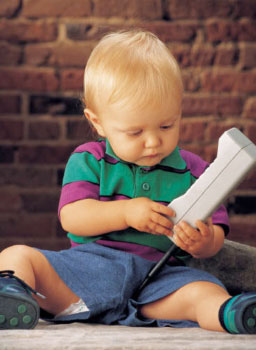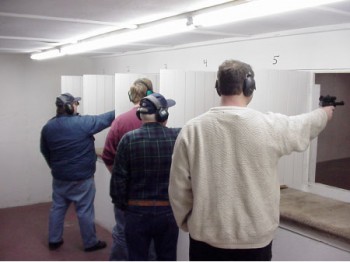Protect Yourself and Your Family
By Martin Valcin and James Blando
Lead Dust and Fumes Are Harmful
Lead is a metal commonly used to make bullets. Exposure to lead dust created through the use of lead bullets poses a hazard to shooters, instructors, and maintenance staff at firing ranges. While the handling, shooting, and loading of lead bullets can create a fine dust, the melting of lead to cast bullets can produce lead fume. Lead dust and fumes can remain airborne for several hours and therefore can be easily inhaled.
Exposure to lead can cause lead poisoning. Potential health effects and symptoms of lead poisoning include irritation of the eyes and throat, tiredness, metallic taste, poor appetite, weight loss, colic, upset stomach, nausea, vomiting, increase in blood pressure, muscle and joint pain, and kidney and nerve damage. The New Jersey Department of Health and Senior Services identified four persons who were poisoned by lead when making lead bullets or shot but there are many more that are not identified.

Medical research has shown that lead poisoning can affect a child’s behavior and intellectual development. Children are especially vulnerable to lead because their organs and central nervous system are still developing, and their bodies are not able to eliminate the lead they absorb.
Lead poisoning symptoms are not always visible. So it is crucial that you to consult your doctor if you think you or a family member have lead poisoning or been exposed to lead. Your local health department and the national poison control center (1-800-222-1222) can also be contacted for additional information.
Lead dust can also be carried home on your body, clothes, shoes, and shooting gear, causing contamination of household surfaces. This can result in a hazard to you and your family members. However, “take-home lead” is preventable by following very simple procedures.
How to Protect Yourself and Your Family
The following are some simple steps one can take to reduce lead hazards at the firing range and at home:
- Use non-leaded ammunition and primer whenever possible. Consult your range master or manager.
- Lead bullets should only be cast or fabricated in workshops properly equipped to control exposure. These same workshops must also be staffed by trained craftsmen who understand how to protect themselves.
- Never load bullets in an unventilated area, inside the home, or anywhere children may frequent.
- Don’t eat, drink, or smoke inside the range.
- Use one pair of shoes and a set of washable clothes for shooting. Leave them in your locker at the range if possible, or keep them in a plastic bag. Wash clothes worn at the range regularly and wash them separately from your other clothes and family laundry.
- Wash hands after shooting, cleaning firearms, picking up spent casings/pellets, or reloading ammunition.
- Cleaning and maintenance work at the firing range should be performed by individuals trained in the proper techniques of exposure control.
- Dry sweeping and vacuuming should be prohibited since this can stir up lead dust. Cleaning should be done using a wet mop or a HEPA vacuum.
- Melting lead to cast bullets creates lead fume and dust. Do not cast or fabricate bullets at home!
- Avoid or minimize lead exposure from other activities or hobbies such as making fishing sinkers, using lead solder, making stained glass art objects, cutting or burning painted steel, or renovating older homes that may contain lead paint.
For more information and help, please call the New Jersey Department of Health and Senior Services, Occupational Health Surveillance Progam at (609) 984-1863 or visit us on the web at:
http://www.nj.gov/health/surv/index.shtml
 Both outdoor and indoor firing ranges must be carefully maintained to prevent exposure of shooters and staff to lead. Even at modest levels of activity, a firing range can become contaminated with a large amount of lead dust. The ventilation in an indoor range should be designed to follow appropriate guidelines. Several professional organizations representing firing ranges have detailed guidelines for this purpose.
Both outdoor and indoor firing ranges must be carefully maintained to prevent exposure of shooters and staff to lead. Even at modest levels of activity, a firing range can become contaminated with a large amount of lead dust. The ventilation in an indoor range should be designed to follow appropriate guidelines. Several professional organizations representing firing ranges have detailed guidelines for this purpose.
The New Jersey Public Employees Occupational Safety and Health (PEOSH) Program enforces the standard for indoor firing ranges for New Jersey public employees (N.J.A.C. 12:100-8). Although the standard does not cover firing ranges in the private sector, useful information on preventing lead exposure can be obtained from this resource. To obtain a copy of the standard, please contact the PEOSH Program at (609) 984-1863 or download the document from their Web page at www.nj.gov/health/eoh/peoshweb.
Martin Valcin is an intern and a graduate from the Master of Public Health Program at Rutgers University. Dr. James Blando is a Research Scientist at the New Jersey Department of Health and Senior Services, Occupational Health Surveillance Program.



It is true that Lead poisoning symptoms are not always visible in children. Your basic steps to reduce the reduce lead hazards at the firing range was helpful to take precautions against lead poisoning.